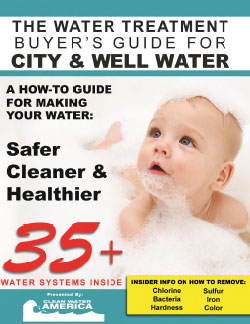Hard Water and Soft Water Explained
Did our Ancestors Have Soft Water?
Our great-great-great-grandparents knew well the worth of soft water when they collected rainwater for washing laundry, bathing and drinking. My Grandmother always
used her collected rain water to rinse her hair after a shampoo. But, with all of the 20th century progress, conveniences and appliances, we seem to have forgotten the value of softened water.
What is Soft Water and Hard Water?
Rain water begins as soft water, free of minerals, but as it passes over and through the earth, flowing into lakes, rivers, streams and ground water, it absorbs the hardness minerals. While these minerals arenʼt harmful to your health, they do affect the properties of water and itʼs effectiveness for washing and cleaning and can make simple household tasks hard work because soaps and detergents donʼt lather or work as well. Water processed through a Softener returns the water properties to their original state free of minerals. That means less detergent and soap is needed for laundry, baths, shampooing, and cleaning. There are no bathtub or potty rings, no spots on dishes or glasses, brighter, whiter laundry, and less wear and tear on appliances requiring less maintenance and repair.
What Causes Hard Water Stains?
Hard water stains are caused by calcium and magnesium bicarbonate also known as dissolved solids. These dissolved solids are rushed through pipes to your home and
they become an almost insoluble limestone. You will see this as as white scaly deposits on glassware, showers, dingy white clothing and dull hair.
Does the EPA have Guidelines for Acceptable Water Hardness?
The EPA has recommended guidelines for the amount of total dissolved solids in household drinking water but it is up to your state to endorse and regulate these
guidelines. Then it is up to you to bring your water up to a standard that is preferred by you for your family.
What Damage does Hard Water do to Homes.
Quite simply, hard water will eventually harm plumbing and fixtures,appliances and other household objects. The American Water Works Association reports that without a water softener the life of water heaters are cut in half, toilets by 70%, faucets by 40% and dishwashers and washing machines by 30%. In 1990 Purdue Universityʼs research team reports that hard water shortens the life of fabrics by as much as 15% as well as dulls their appearance. Hard water causes a grayish tinge to laundry, streaks on glassware and silverware, white deposits inside teakettles, coffeemakers, humidifiers and hot water heaters, streaking on shower doors and etching on sink and tub faucets along with dry, itchy skin and dull hair. About 85% of American Homes have hard water. Doesnʼt it make tons of sense to save money and elbow grease by installing a softener to remove hardness from your household water?
Is Soft Water Pure Water?
Reducing the hardness of water to a softened state, has nothing to do with the purity of your drinking water. It can however, have a huge impact on the longevity of your clothes, the effectiveness of your appliances, the appearance of your dishes and glasses, and the cleanliness of your hair and skin.
Where Can I have My Water Tested?
You can either bring a sample of your household water to our Testing Laboratory at one of our Water Center Stores for a complete water analysis or call 239-489-4766 to have one of our professionals test your water in your home. Either way we can advise you on the best treatment system to solve your problem.
What Maintenance is Required for a Softener?
Your softener will require backwashing periodically to wash all the collected hard minerals out of the softening bed. This backwash method can be completed by using either salt, which is the least expensive or potassium chloride. For folks on a salt restricted diet, potassium chloride is the preferred choice as it is safe for the environment, healthy for plant life and can be discharged onto the ground.


